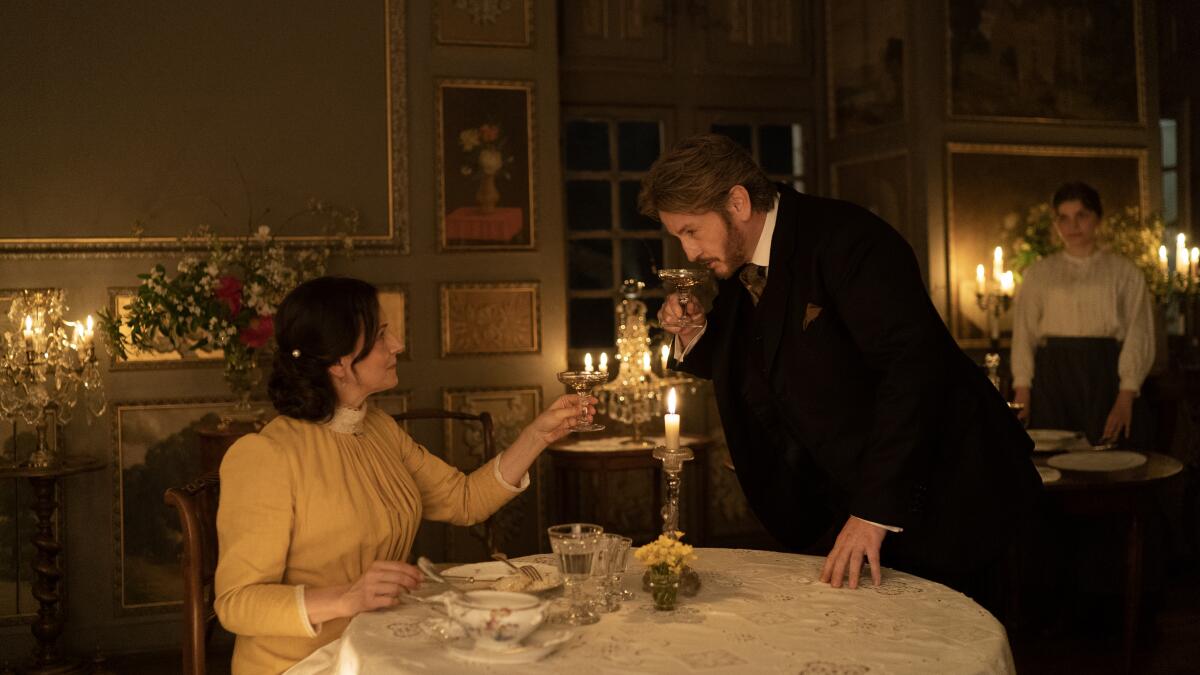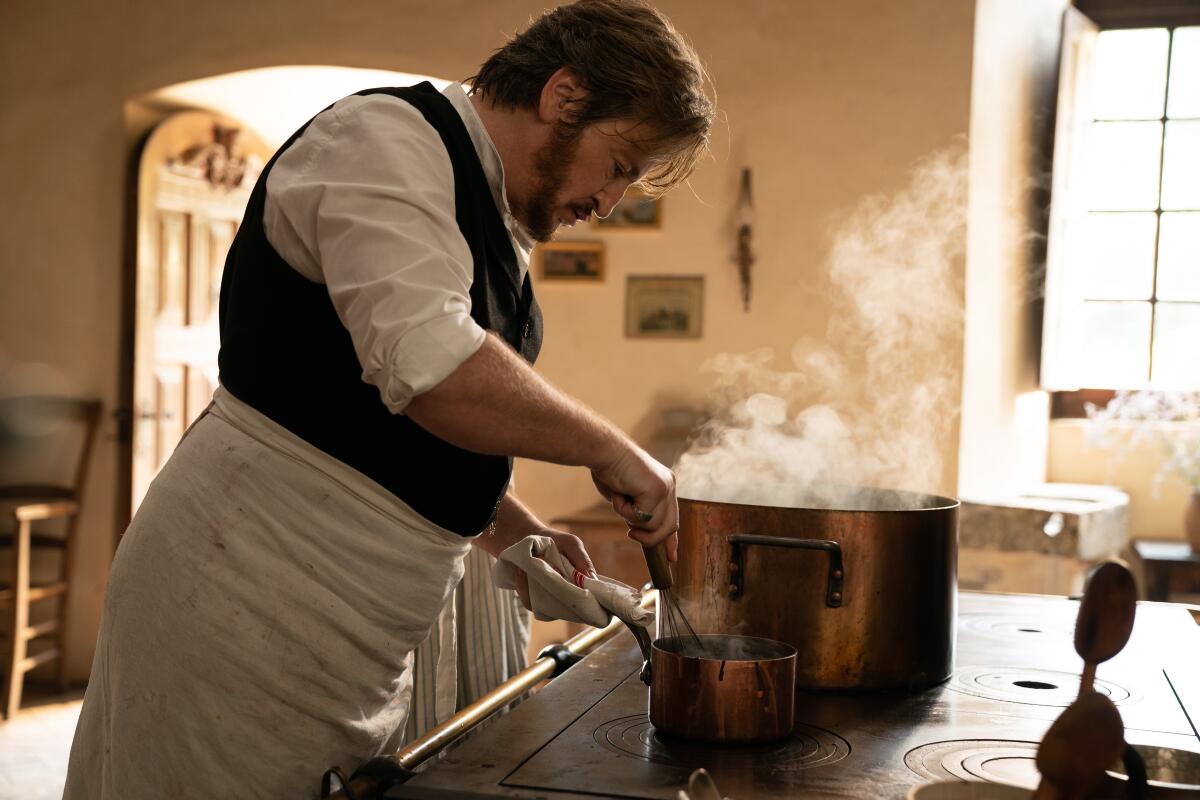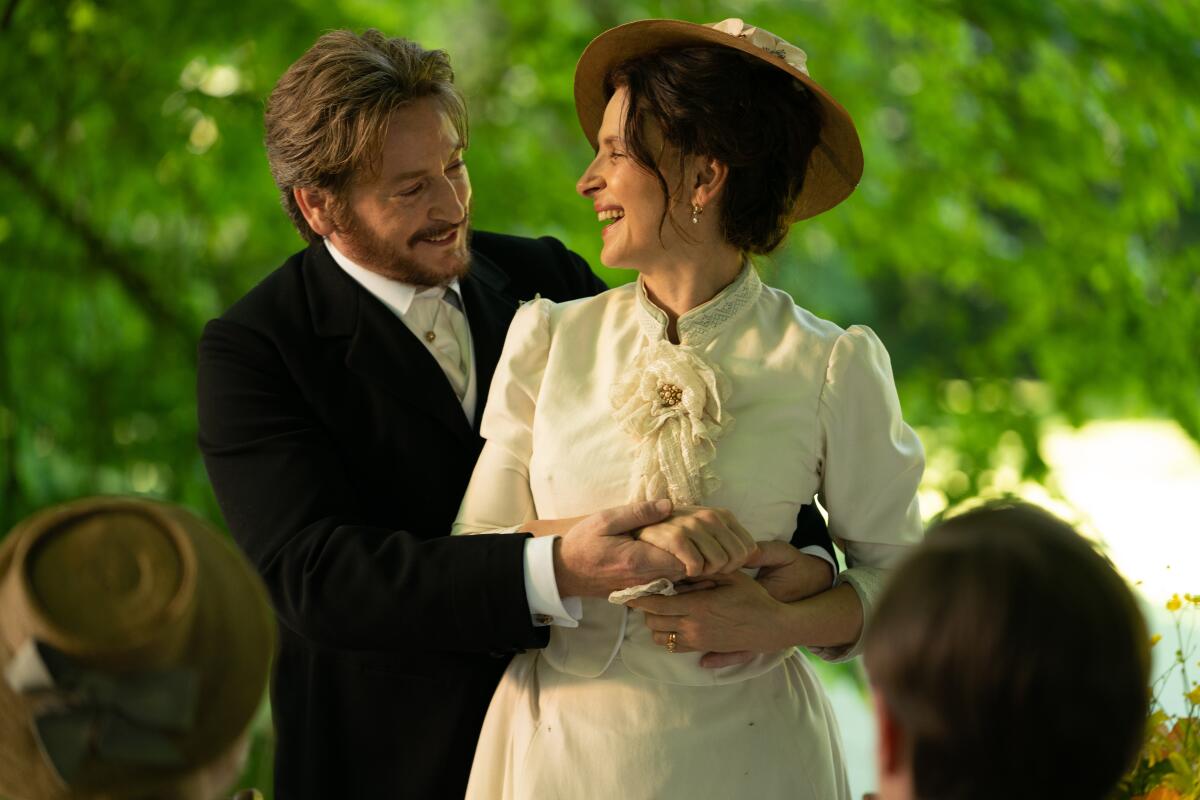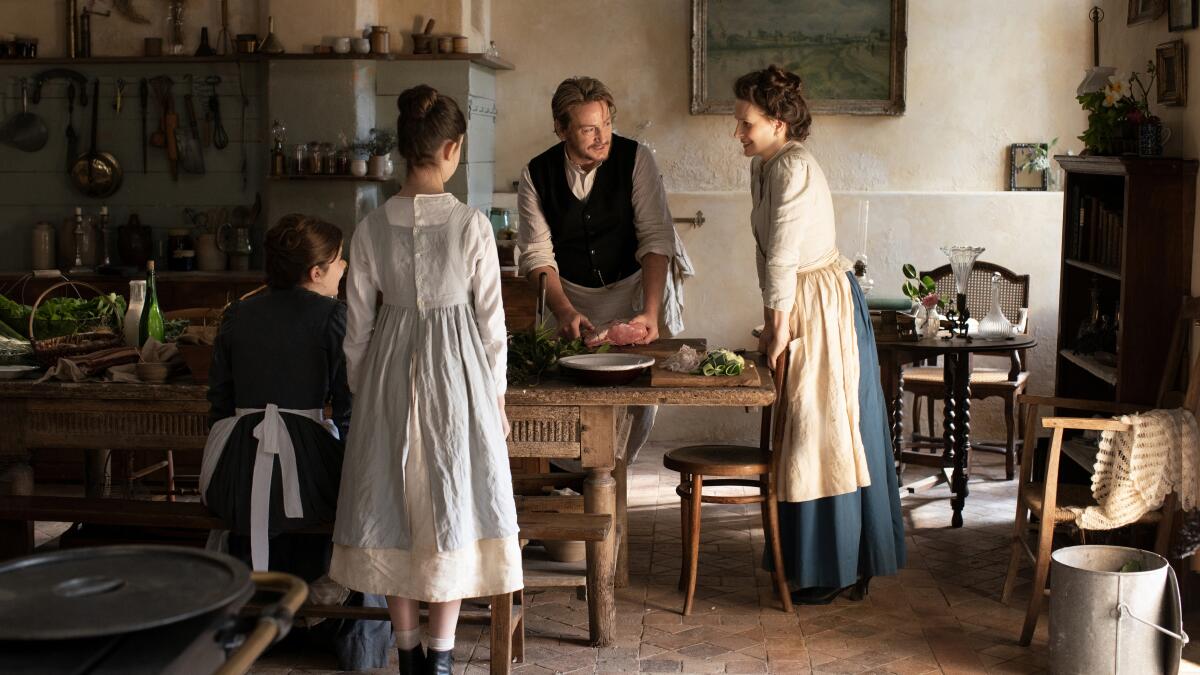Juliette Binoche serves up some exquisite culinary drama in ‘The Taste of Things’

- Share via
Since it premiered and won a directing prize at the Cannes Film Festival last May, Tran Anh Hung’s “The Taste of Things” has been described — and sometimes dismissed — as a gastronome’s delight, a worthy heir to the food-porn throne occupied by classics like “Babette’s Feast” and “Eat Drink Man Woman.” None of this is incorrect. For much of this absorbing and pleasurable movie, we are in a rustic 19th century French kitchen, savoring, with our eyes and ears if not our tastebuds, the preparation of one exquisite dish after another. Each course is practically a feast unto itself: vol-au-vent, roasted veal loin, poached turbot, baked Alaska — and that’s just the first half-hour.
Warm light streams in through the windows, glinting off battered copperware and catching the faint sheen of sweat on Juliette Binoche’s radiant, steam-bathed face. Her character, Eugénie, has spent more than two decades cooking for and alongside the renowned gourmet Dodin Bouffant (Benoît Magimel). When we first meet Eugénie, she is preparing a lavish meal for Dodin and his coterie of culinary devotees, as we see in a gloriously luxuriant sequence that has the panache and precision of a great musical number. The music, in this case, arises not from a conventional score, but rather from the diegetic accompaniments of soup bubbling in a pot, butter sizzling in a pan and utensils scraping against crockery.
Hung, a French Vietnamese filmmaker whose eye for cinematic sensualism was on display in early works like “The Scent of Green Papaya” and “Cyclo,” here achieves something of a culinary contact high. If “The Taste of Things” is two-plus hours’ worth of haute-cuisine eye candy, it could also be plausibly defended as one of the year’s great action movies: In a perfectly modulated and sustained 40-minute opening sequence, Eugénie guts a fish, boils eggs, funnels sauce, spoons quenelles and torches meringues, commanding the kitchen with effortless, near-wordless assurance. The dishes come together like dazzling, sometimes ingeniously surprising set-pieces, nudged along by the robust, sweeping movements of Jonathan Ricquebourg’s camera and the turbot-charged rhythms of Mario Battistel’s editing. (Cooking was supervised by the famed French chef Pierre Gagnaire, who served as the movie’s culinary director.)

In time, the action spills out into the dining room, where Dodin and his companions (played by actors including Patrick d’Assumçao, Frédéric Fisbach and Emmanuel Salinger) devour and discourse in the grand and very Gallic tradition. A few wisps of plot materialize in between sips of wine and dollops of philosophizing. Mostly, though, there is a warm atmosphere of unhurried indulgence and guilt-free pleasure, as well as an unspoken acknowledgment that pleasure is serious business. Dodin is known throughout France as “the Napoleon of the culinary arts,” and Eugénie, his unofficial but long-standing Joséphine, has established her own formidable reputation.
“You are an artist,” one of the diners beams at her in a flush of postprandial gratitude. Eugénie brushes aside the compliment, claiming herself to be a mere disciple in the shadow of a genuine great like Antonin Carême. But “The Taste of Things,” which will represent France in the upcoming Oscar race for international feature, contradicts her in every gleaming frame. The gentle yet insistent refrain of this movie, which was loosely inspired by Marcel Rouff’s classic 1924 novel “The Passionate Epicure,” is that Eugénie and Dodin are artists. With grace, patience and a witty eye for curiosities (if you’ve never seen the proper way to eat an ortolan, voilà), Hung brings a slow-food sensibility to bear on an often fast-food medium.
It’s the artist in Eugénie that we love, and that Dodin loves as well. Dish by dish, the two have forged a bond more intimate and sustained than some lifelong couples, though Eugénie, who lives in Dodin’s chateau, continues to assert her independence by resisting his frequent marriage proposals. It’s as if their devotion to each other, and to their shared appetite for great food, were too pure and exalted to require the institutional sanction of matrimony. They cook; therefore, they are.

The rapport between the two leads is extraordinary, and those who know of Binoche and Magimel’s own past romantic history may find themselves especially moved by the tenderness of their on-screen reunion here. Their performances combine emotional delicacy and robust physicality — those heavy pots don’t lift themselves — and you can read years of devotion into the way their movements harmonize in the kitchen, or the tenderness with which Dodin prepares a plate of oysters for the woman he loves. The implicit connections between culinary and carnal appetites scarcely need to be spelled out (“Your broth is delicious” is surely one of the year’s sexiest lines), though you don’t mind when they are, usually when Dodin steals up to Eugénie’s room for a nightcap and possibly more.
Their lives are consumed, so to speak, with not only the practice but also the preservation and perpetuation of their art. One of the most significant characters here is a young girl named Pauline (a wonderful Bonnie Chagneau-Ravoire), who works alongside the older Violette (Galatéa Bellugi) in Dodin’s kitchen, and who, despite her young age, has a precocious palette and the will and desire to become a master cook. Even so, it will be a long journey, and both Dodin and Eugénie, enchanted by Pauline’s prodigious gifts, know the sacrifices involved. During intimate evening reveries and at occasional large-scale gatherings, they muse over the decades they’ve spent cultivating their own talents, with joy, satisfaction and maybe a twinge of regret.

And so despite its generally frictionless flow from meal to meal, its showstopping delicacies and subtly comical asides, “The Taste of Things” is haunted, from the start, by an awareness of the passage of time. Eugénie’s own ailing health, her insistence on carrying on in the kitchen despite mysterious fainting spells, is a recurring reminder that nothing lasts forever, not yesterday’s meals or even tomorrow’s discoveries. Dodin’s own understanding of this may be what spurs him to prepare, in one of the movie’s climactic sequences, not a radical, cutting-edge dish but rather a timeless one, so timeless that it will years later be declared the national dish of France.
He decides he will make a pot-au-feu, a humble serving of boiled meat and vegetables that he plans to cook and serve with exceptional care. The dish is basically to this movie what the ratatouille was to “Ratatouille,” and it’s worth noting that Hung’s movie (known as “La Passion de Dodin Bouffant” in French) at one point bore the English-language working title of “The Pot-au-Feu.” I wish that title had stuck, though you should see “The Taste of Things” under any name. As one crucial scene reminds us, what something is called — a cook, a wife, an apprentice, an artist — matters far less than the complex and sometimes sublime reality of what it is.
'The Taste of Things'
Not rated
In French with English subtitles
Running time: 2 hours, 16 minutes
Playing: Laemmle Royal, West Los Angeles
More to Read
Only good movies
Get the Indie Focus newsletter, Mark Olsen's weekly guide to the world of cinema.
You may occasionally receive promotional content from the Los Angeles Times.










